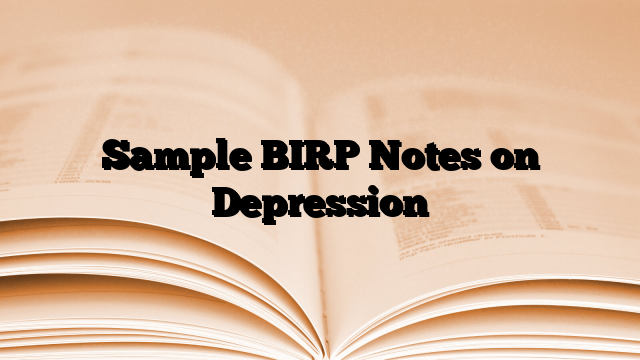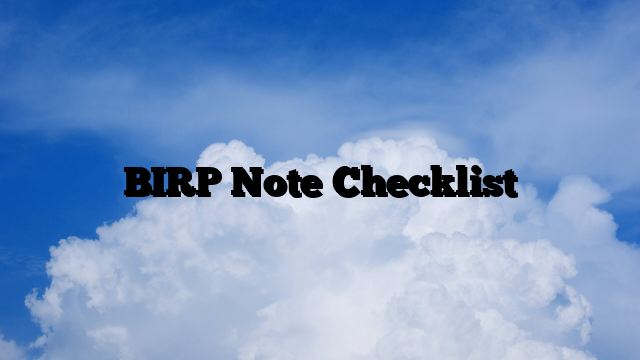BIRP notes, are a popular method used by mental health professionals to document patient sessions. This format helps in creating a structured and efficient way to record the significant aspects of each session. In this blog, we’ll tell you how BIRP notes can be utilized for a patient experiencing depression, providing a sample note to illustrate the process.
Creating a BIRP note for client with depression
Behavior
The ‘Behavior’ section of the BIRP notes focuses on the client’s behaviors, both verbal and non-verbal, observed during the session. For a patient with depression, this might include:
- Demonstrating low energy and fatigue.
- Expressing feelings of hopelessness or worthlessness.
- Difficulty in concentrating or making decisions.
- Showing a lack of interest in previously enjoyed activities.
Intervention
This section details the interventions or techniques used by the therapist to address the behaviors and issues presented by the client. For depression, interventions might include:
- Cognitive Behavioral Therapy (CBT) techniques to challenge negative thought patterns.
- Mindfulness and relaxation exercises to manage anxiety and stress.
- Discussing and setting achievable goals to improve daily functioning.
- Encouraging the client to engage in physical activity or hobbies.
Response
In the ‘Response’ section, the therapist records the client’s reaction to the interventions. This includes any changes in behavior, mood, or thoughts expressed by the client with depression.
Plan
The ‘Plan’ section outlines the next steps for both the therapist and the client with depression. This might include homework assignments, future session topics, or adjustments to treatment strategies.
Sample BIRP Notes on Depression
Date: 2023-12-23
Client: [Client Name]
Presenting Problem: Depression
B: Behavior
- Client arrived on time for the session, but appeared withdrawn and had a slumped posture.
- Reported feeling down and unmotivated for the past week.
- Difficulty sleeping, waking up in the middle of the night and unable to fall back asleep.
- Loss of interest in previously enjoyable activities.
- Increased isolation and avoidance of social interactions.
- Tearful when discussing recent challenges.
- Mentioned feeling hopeless and helpless about the future.
I: Intervention
- Validated client’s feelings and acknowledged the difficulty of navigating depression.
- Encouraged client to share specific thoughts and experiences contributing to their low mood.
- Explored coping mechanisms currently used and their effectiveness.
- Introduced cognitive-behavioral therapy (CBT) strategies for challenging negative thoughts.
- Practiced relaxation techniques for improved sleep hygiene.
- Reviewed safety plan and emergency contacts.
R: Response
- Client seemed slightly less tense after sharing personal struggles.
- Showed some openness to learning and practicing CBT techniques.
- Expressed hesitancy towards relaxation exercises due to past difficulties.
- Confirmed understanding of safety plan and contact information.
P: Plan
- Continue exploring the triggers and patterns associated with client’s low mood.
- Assign specific CBT exercises for challenging negative thoughts and cognitive distortions.
- Encourage practicing relaxation techniques and monitor their effectiveness.
- Schedule follow-up appointment next week to assess progress and adjust interventions as needed.
- Consider referral to sleep specialist if sleep disturbance persists.
Additional Notes:
- Client mentioned upcoming family gathering that they are dreading. Discuss potential strategies for managing difficult emotions during the event.
- Be mindful of client’s safety and monitor for any suicidal ideation or risk factors.
Conclusion
In conclusion, the sample BIRP note on depression provides a comprehensive view of a patient’s treatment journey. It effectively bridges Behavioral observations, Interventions utilized, the patient’s Response to these interventions, and the Plan for future sessions. This note exemplifies the importance of detailed documentation in mental health care, highlighting progress and challenges in treating depression. It also underscores the need for personalized, empathetic approaches in mental health treatments. Ultimately, such meticulous record-keeping not only aids clinicians in providing better care but also helps patients see tangible progress in their mental health journey.
Disclaimer: This is just a sample and should not be used as a substitute for professional clinical judgment. BIRP notes should be customized to accurately reflect the specific client and session details. Remember to maintain client confidentiality and adhere to ethical guidelines.






